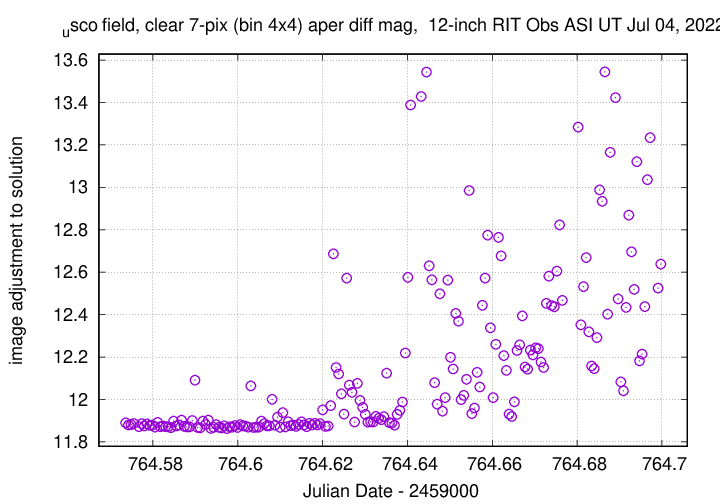
On the night of Jul 03/04, 2022, under fair conditions, I acquired images of the outbursting cataclysmic variable star U Sco.
The first half of the run was very clean, but clouds added noise to the second half. The target faded sharply, by about 0.8 mag, since the previous night.
U Sco is a cataclysmic variable which only rarely is caught in an outburst. This one was first noticed at UT 2022 June 6.720 by Masayuki Moriyama. The star reached a peak brightness of about V = 8, but faded quite a bit by this evening; it is currently about V = 15.5.
The main setup was:
Notes from the night:
The object is located at
RA = 16:22:30.78 Dec = -17:52:42.8 (J2000)
A chart of the field is shown below. The size of the chart is about 42 x 30 arcminutes.

I've marked the location of several comparison stars as well, which appear on the AAVSO chart of comparison stars.
I'll use star "A" to shift my instrumental magnitudes to the V-band scale.
I took a photo of the finder TV's screen when pointing to this target; this could be a useful reference for the future:

The sky value shows clear skies turning cloudy.

The FWHM graph below shows a value that increased late, as the temperature began to drop quickly.

Using aperture photometry with a radius of 7 pixels in clear filter (binned 4x4, each pixel is 1.052 arcsec, so a radius of 7.4 arcsec), I measured the instrumental magnitudes of a number of reference stars and the target. Following the procedures outlined by Kent Honeycutt's article on inhomogeneous ensemble photometry, I used all stars available in each image to define a reference frame, and measured each star against this frame.
Sigma-vs-mag plots show that the floor was about 0.015 mag; if I only included images from the early, clear portion of the night, this shrank to a very nice 0.007 mag.

The change in zeropoint shows how bad the clouds became.

The measurements show a large decline in brightness.

You can download my measurements below. A copy of the header of the file is shown to explain the format.
# Measurements of U_Sco made at RIT Obs, UT 2022 Jul 4, # in fair conditions, # by Michael Richmond, # using Meade 12-inch LX200 and ASI 6200MM. # Exposures 45 seconds long, clear filter. # Tabulated times are midexposure (FITS header time - half exposure length) # and accurate only to +/- 1 second (??). # 'mag' is a differential magnitude based on ensemble photometry # using a circular aperture of radius 7 pix = 7.4 arcseconds. # which has been shifted so AAVSO 000-BBX-431 has mag=10.707 # which is its V-band magnitude according to AAVSO. # # UT_day JD HJD mag uncert Jul04.07483 2459764.57483 2459764.57963 15.018 0.054 Jul04.07546 2459764.57546 2459764.58026 15.117 0.045 Jul04.07671 2459764.57671 2459764.58151 15.179 0.072
Last modified 7/04/2022 by MWR.